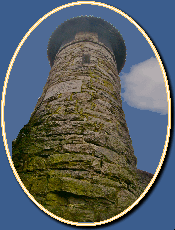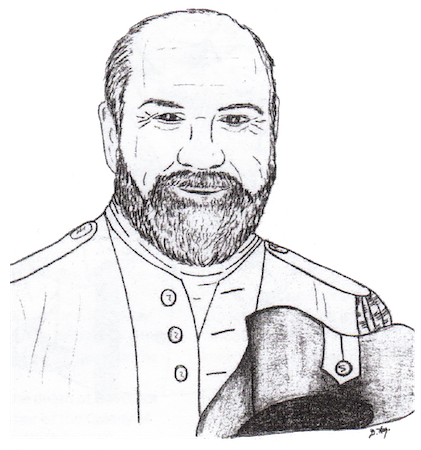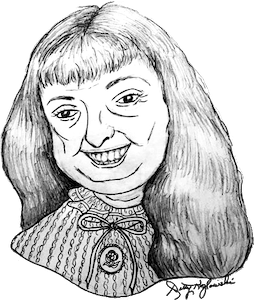Milford’s martyr
In the colonial era, Milford made its mark in the movement towards independence from Great Britain. The American Revolution was the direct outgrowth of numerous English atrocities that undermined the values of the colonists. Although the war involved all of the colonies, Milford, Connecticut, and Stephen Stow played an unforgettable part in the history defining ordeal.
In 1776, Connecticut underwent serious debate over deciding whether or not to enter the war against the British. Stephen Stow himself was caught-up in this debate. Once while attending services in the Episcopal church, where he owned pew number two, he became outraged when the minister preached a sermon entitled “Loyalty to the King”. He vowed he would never attend services in that church again (History of Milford 59-60). Even though Connecticut saw little military action, there were some minor battles at Stonington (1775), Danbury (1777), New Haven (1779), and New London (1781) (Patriots xi). Norwalk and Fairfield were also raided by the British. The Milford shore was longer in 1776 than it is currently (Gregory Personal Interview 13 June 2009) and the Milford colonists were fearful of raids by the British along its coast. There were six cannons placed at Fort Trumbull Beach, at the mouth of the Milford Harbor(Stephen Stow 1). These cannons were stationed there to defend against any oncoming attack from the British.
On an indescribably cold winter night in December 1776, two hundred poorly clad prisoners of war were landed on the Long Island shore in Milford (Stephen Stow 1). They had been released from a British ship enroute to New London after they had been transferred from the prison ship Jersey (Stephen Stow 1) which was permanently located in New York Harbor. The prisoners of war were put ashore in Milford and abandoned, forced to wander the sleepy town. It is said that these men were being brought to be exchanged for British prisoners of war (Gregory Personal Interview 13 June 2009) when they fell suddenly ill. The travel on the sea had been unkind to them and they suffered the ill effects of being on the sea for an extended period of time.
Close to where the men were dropped, Captain Isaac Miles and Captain Stephen Stow lived. At first, the captains were frightened by the sound of the prisoners who were walking outside. In an act of unparalleled kindness, the men attempted to alleviate the prisoners’ pain by offering them refuge in their kitchens (Stephen Stow 1). After a night of generous help, the men realized that their efforts would be in vain as the months of hardship had worn the prisoners down tremendously and many of the men had become sick with ship fever and especially the highly contagious deadly smallpox. The local townhouse was quickly turned into a makeshift hospital (Gregory Personal Interview 13 June 2009).
There was difficulty in finding people to help nurse the soldiers because they did not want to risk the chance of being infected by smallpox themselves. One man took on this humanitarian effort despite the knowledge and would probably cost him his life. Captain Stow was willing to sacrifice his life for the greater good (Stephen Stow 1). He acknowledged the imminence of death by making a will before he left to go to the soldiers’ aid. Dr. Elias Carrington (Gregory Personal Interview 13 June 2009) made an attempt to inoculate those who were willing to help. Stow actually served more as a nurse (Gregory Personal Interview 13 June 2009) than as a doctor.
These prisoners of war were part of the more than 10,000 patriot soldiers that were captured during the battles around New York City. About 47 percent of the 8,500 soldiers placed in prison camps in New York died due to disease and starvation (Forgotten Patriots xi). The conditions in the camps were very detrimental to the health of the individuals imprisoned since there was a scarcity of food and medical treatment available. The army gathered testimonies from random individuals that told of the terrible living conditions in the camps which led to illness. Because of presence of so many starving people forced to live in overcrowded, hastily made prisons such as warehouses or the holds of ships, disease easily spread from person to person (Forgotten Patriots 72).
Born in Middletown, Connecticut, Stephen Stow (Lineage Book 77) was a rather ordinary individual who attained his status through arduous labor. Stow was not a native of Milford but called it his home (Gregory Personal Interview 13 June 2009). Stephen Stow’s house was built sometime in 1680. It rested on Wharf Street which is now called High Street (Historic Houses of Early America 308). Captain Stow probably spent little time in his home since his occupation as ship master kept him at sea and thus not in a position to accept any civic or military office. Thus, there would be little told about him in the public records (Gregory Personal Interview 13 June 2009). We do know , however, he committed his life to this noble mission of mercy and died at the age of fifty-one ( Stephen Stow 1). With his wife Freelove Baldwin Stow, he had four healthy children named Stephen, Samuel, John, and Jedediah all of whom participated in the American Revolution (Stephen Stow 1). He earned the prestigious title of “The Martyr” for his voluntary service to aid the sick prisoners of war.
Captain Stephen Stow made a valiant effort to help the sick prisoners. He was able to make the last days of a few men much better. He constantly tended to the sufferers who were very appreciative of his help. Forty-six of the almost two hundred prisoners (Gregory Personal Interview 13 June 2009), who were sick, died. As he grew more and more tired, Captain Stow put himself into danger of contracting small pox, eventually dying as a result of it.
Today near the entrance to the Milford Cemetery, there is a monument in honor of Stephen Stow (Gregory Personal Interview 13 June 2009). The memorial reads: "In memory of Capt. Stephen Stow of Milford, who died Feb 8, 1777, at the age of fifty-one. To administer to the wants and soothe the miseries of these sick and dying soldiers, was a work of extreme self denial and danger, as many of them were suffering from loathsome and contagious maladies, voluntarily leaving his family to relieve these suffering men, he contracted disease from them, died, and was buried with them. He had already given four sons to serve in the war for independence. And to commemorate his self sacrificing devotion to his country, and to humanity, the legislature of Connecticut resolved that his name should be inscribed on this monument"(Stephen Stow 1). Captain Stow probably spent little time in his home since his occupation as ship master kept him at sea and thus not in a position to accept any civic or military office. Thus, there would be little told about him in the public records (Gregory Personal Interview 13 June 2009).
Besides the monument in honor of Stephen Stow, there was a representative song created in honor of the men who died. The song is “Shape the Invisible” by Martin Page. It goes: “There’s a broken man / Praying for a wounded land. / Oh why can’t we shape the invisible / For faith that’s blind / The voice of reason cries / Oh why can’t we shape the invisible/ A mother’s son / Is now a soldier marching on / He’s been told to shape the invisible/ Under poisoned skies/ The children wonder why / Our fathers can’t shape the invisible / Somewhere a small boy playing with his toys/ Someday his innocence will /Shape The Invisible”. (Stephen Stow 1)
In conclusion, it is because of the sacrifice of great men like Stephen Stow and those captured soldiers that the colonies eventually gained independence from England. Unfortunately, many of the men who died with Stephen Stow have been unidentified, though there are some names like John (Gregory Personal Interview 13 June 2009) with no last names provided. As long as we continue to inspire a new generation with their story of sacrifice, their efforts unlike their names will not be forgotten.



